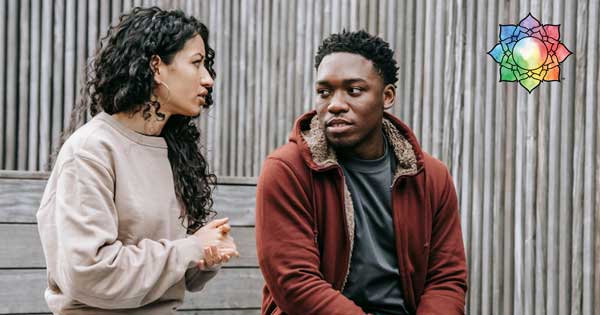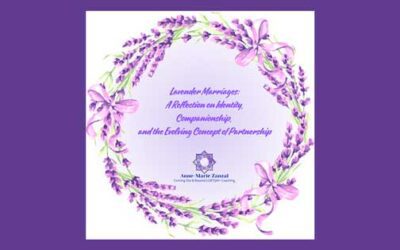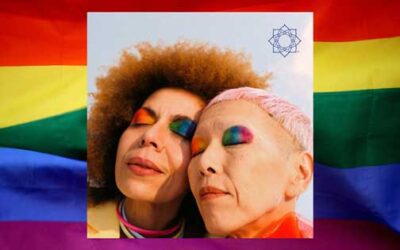So you have figured out that you may not be as straight as you thought you were. Now what? Do you separate and divorce? Do you decide to live in a mixed-orientation marriage, when one partner is straight and the other is not? Or do you try to have your needs met and open up your marriage?
It was Clear to Both of Us, I Wasn’t Straight
In my own coming out experience, my ex was fully aware that I was not straight for the last six years of our marriage. I was working in hospice as a chaplain and I was gifted with the experience of working with folks who were dying. I am not going to romanticize the experience of the dying, but what they taught me is essential: People regret the experiences that they did not pursue in life. If they made a mistake in their choices, they often made meaning of these experiences for themselves.
As I began to contemplate my own mortality, I realized that if I did not have an experience of being with a woman before I died, I would regret it. Initially, like most folks coming out, it was about the physical aspect, but as I pondered all of this and what it would mean, I realized that I wanted an emotional, spiritual, intellectual, and physical relationship with a woman.
Where do we go from here? Separate? Open Marriage?
There was one problem, I was still married to my now ex-husband. Like most women, who come out late, I would describe my husband as my best friend. In many ways we were and we were also united around the love of our four children. He knew I was gay, but since I never actually pursued anything, it was a moot point. We began to talk about what our next steps would be if I was to pursue exploring my sexuality. (Yes, he was fully aware of everything and gave me his permission. However, we decided to separate and divorce before that happened.)
Like most couples we talked about a threesome with a woman, opening our marriage, and practicing polyamory. We quickly dismissed all these options, I did not want a threesome, as I said to my ex, “If I sleep with a woman, you are not going to be there.” We also knew as individuals that we were just not capable of opening up our marriage, we knew our limitations. Most monogamous couples can’t open their marriage, but many of them try.
Opening Your Marriage is A Deeply Personal Choice
Deciding whether to open a marriage is deeply personal and depends on the specific circumstances and dynamics of your relationship. I have witnessed over and over again in our later-in-life community that folks open up their marriages to often less-than-ideal results. This article is written with the attempt to provide what to think about as you move toward opening your marriage or practicing polyamory to pursue a LGBTQIA+ relationship.
For clarity, I define an open marriage as when a couple decides to pursue an individual sexual relationship with others outside of their marriage.
Polyamory is a non-monogamous relationship style where people mutually agree to have multiple sexual or romantic relationships separately or together. I spoke with Cassandra Jones, a polyamory expert in this episode of Coming Out & Beyond about the struggles of monogamous couples as they enter the polyamory world.
Navigating the Change from Monogamy to Polyamory
In the later-in-life community, most folks decide to pursue an open relationship. Did your husband say, “I am ok with you sleeping with a woman, but if this was a man I would not consent to an open marriage!” Inherently, patriarchy and misogyny is running through this statement. We do not value relationships with women as much as we do with men. Many couples think after all, what harm could it do? If a woman is gay or bi it might open your relationship to emotions that none of you ever expected.
For example, when you have a relationship with another woman or person, you are allowing a whole other being into your relationship who rightly has their own thoughts, feelings, and emotions. All of this can greatly affect your relationship with your husband and family.
Some Perspectives to Consider as You Make Your Decision
One partner’s desire to explore their sexuality or gender identity outside of the marriage may lead to feelings of resentment or betrayal in the other partner. This can strain the relationship and erode trust.
Open Means You Both Get to Explore, Not Just You
Something many women do not consider is that their husband may find a girlfriend first and leave the marriage. This often alters the timeline they have in their head of how things will work. Conversely, a spouse may feel comfortable with the existing monogamous arrangement and does not explore. The spouse who is exploring can often feel guilty and express that they are living two lives. It can be exhausting.
Both partners may not be emotionally or mentally prepared for the complexities and challenges that come with opening a marriage. This lack of readiness can lead to misunderstandings, hurt feelings, and relationship conflicts.

Changes to Family Dynamics, Legal Rights, and Finances in Ways You May Not Expect
If the couple has children or extended family members, opening the marriage can have significant repercussions on family dynamics and relationships. It’s essential to consider the potential impact on children and ensure their well-being is prioritized.
Opening a marriage can have legal and financial implications, such as asset division, inheritance rights, and spousal support. It’s important to seek legal advice to understand these implications fully.
Open Marriages are a Step on the Journey, Not a Long-Term Solution
I recently was on a podcast with Our Path. This podcast is for straight folks who are married to gay partners. The host, Kristin Kalalbi (who’s ex-husband came out as gay) and I reflected on how both of us have seen that open marriages do not work for our communities. Both of us estimated that probably about 10% of those who try actually succeed. We both agreed it was often a stop along the journey for most folks until one partner can no longer tolerate this dynamic.
As an expert in grief, I have also come to see the opening of marriage as bargaining in the five stages of grief: denial, anger, bargaining, depression, and acceptance. When we come out as LGBTQIA+ to our partner and our relationship has changed. The grief is very, very real and we are often trying to save something that may need to be renegotiated or ended.
Ultimately, You Have to Do What is Best for You & Your Situation
Coming out later in life can be emotionally challenging for both partners. Introducing the complexity of opening the marriage may add additional stress and uncertainty to an already difficult situation. Ultimately, the decision to open a marriage when coming out later in life should be made carefully and with full consideration of the potential impact on both partners and their relationship. It may just be a stopping place for your relationship with your spouse and not the final destination. It’s essential for couples to communicate openly, seek support from qualified professionals, and prioritize their well-being.
Looking for support on your coming out journey? Anne-Marie Zanzal is hosting a workshop! You can find out all the details here: comingoutsupport.net. You can also connect with Anne-Marie on Facebook, Instagram, TikTok and LinkedIn. Her podcast shares the stories of women coming out later in life. Start at the beginning! https://annemariezanzal.com/coming-out-stories-beyond-podcast/








